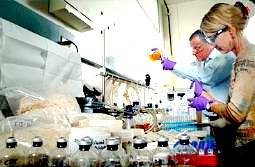Branches of Biology
Online Biology Dictionary
Page 1

The following is a list of the branches of biology, with definitions, pronunciations, and links to related topics. Note, however, that there are so many subbranches within the general field of biology that they cannot be fully listed here. There are many named branches of the discipline that can be found in dictionaries, but that are little known and have few practitioners. The following list, then, attempts to name and define only the major fields:
Fields dealing with animals:
- Comparative anatomy (pronunciation) — The scientific study of similarities and differences in the bodily structures of distinct types of animals.
- Entomology (pronunciation) — The scientific study of insects.
- Ethology (pronunciation) — The scientific study of animal behavior.
- Herpetology (pronunciation) — The scientific study of reptiles and amphibians.
- Ichthyology (pronunciation) — The scientific study of fish.
- Mammalogy (pronunciation) — The scientific study of mammals.
- Nothology (pronunciation) — The study of hybrids.
- Ornithology (pronunciation) — The scientific study of birds.
- Primatology (pronunciation) — The scientific study of primates.
- Veterinary science (pronunciation) — Animal medicine.
- Zoology (pronunciation) — The study of animals.
Branches of biology relevant to the study of evolution:
- Biogeography (pronunciation) — The study of the geographic distributions of living organisms.
- Developmental biology — The study of the processes by which an organism changes from a single cell into a mature, multicellular individual.
- Epigenetics (pronunciation) — The study of heritable changes in phenotype caused by mechanisms other than the alteration of nucleotide sequences.
- Evolutionary biology — The branch of biology concerned with the modes of origin of new forms of life.
- Ichnology (pronunciation) — The study of the fossilized traces of past animal activity, such as footprints, burrows, trails, and borings.
- Morphology (pronunciation) — The branch of biology concerned with the form and structure of living organisms.
- Paleontology (pronunciation) — The study of prehistoric life by means of fossils.
Fields relating to the environment:
- Aerobiology (pronunciation) — The study of airborne organic particles.
- Astrobiology (pronunciation) — The branch of biology concerned with the effects of outer space on living organisms and with the search for extraterrestrial life.
- Bioclimatology (pronunciation) — The study of the influence of climate on living organisms.
- Building biology The study of the indoor living environment
- Chronobiology (pronunciation) — The study of time-dependent phenomena in living organisms.
- Conservation biology — The branches of biology concerned with habitat preservation, the prevention of extinction, and conservation of biodiversity.
- Cryobiology (pronunciation) — The study of the effects of low temperatures on living organisms.
- Ecology (pronunciation) — The study of the interaction of organisms with each other and with their environment.
- Geobiology (pronunciation) — A science that combines geology and biology to study the interactions of organisms with their environment.
- Limnology (pronunciation) — The study of the physical and biological conditions of freshwater, particularly of lakes and ponds.
- Biochemistry (pronunciation) — The study of life at the chemical level, in particular the chemistry of proteins, carbohydrates, and nucleic acids.
Chemistry-based branches of biology:
- Bioengineering (pronunciation) — A hybrid field of scientific research that uses the principles of biology and the techniques of engineering to produce useful products.
- Molecular biology — The branch of biology that studies the formation, structure, and function of macromolecules found in living organisms, particularly nucleic acids and proteins.
Page 1
Most shared on Macroevolution.net:
Human Origins: Are we hybrids?
On the Origins of New Forms of Life
Mammalian Hybrids
Cat-rabbit Hybrids: Fact or fiction?
Famous Biologists
Dog-cow Hybrids
Prothero: A Rebuttal
Branches of Biology
Dog-fox Hybrids